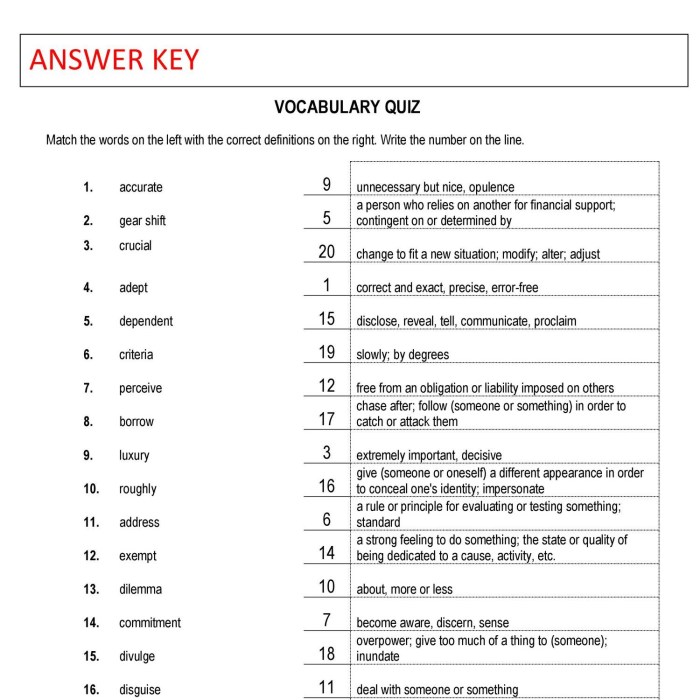As Lesson 10.1 Vocabulary 1 Answer Key takes center stage, this opening passage beckons readers into a world of vocabulary mastery, meticulously crafted to provide a comprehensive understanding of key terms and their usage. Delving into the depths of etymology, word structure, and contextual applications, this guide serves as an invaluable resource for enhancing vocabulary retention and enriching writing proficiency.
Within the confines of this guide, we embark on a linguistic journey, unraveling the intricacies of vocabulary and its profound impact on communication. Through a multifaceted approach that encompasses word analysis, contextual usage, and practical exercises, this answer key empowers learners to confidently navigate the complexities of vocabulary, unlocking its transformative potential.
Vocabulary Definitions

Meanings and Usage
- Articulate:Expressing oneself clearly and effectively. Example: The professor was articulate in his lecture, making complex concepts easy to understand.
- Concise:Expressing ideas in a brief and clear manner. Example: The concise report summarized the key findings of the study.
- Erudite:Having or showing great knowledge or learning. Example: The erudite scholar gave a fascinating lecture on the history of philosophy.
- Eloquent:Speaking or writing in a persuasive and effective manner. Example: The eloquent speaker captivated the audience with their passionate words.
- Laconic:Using few words; concise. Example: The CEO’s laconic email conveyed the company’s decision to all employees.
- Verbose:Using more words than necessary. Example: The verbose article rambled on for pages without getting to the point.
Word Analysis
Structure and Etymology
- Articulate:Latin articulare“to join, divide into parts” → referring to the clear expression of ideas.
- Concise:Latin concisus“cut short” → emphasizing brevity.
- Erudite:Latin eruditus“learned, instructed” → highlighting extensive knowledge.
- Eloquent:Latin eloquens“speaking well” → denoting persuasive speech.
- Laconic:Greek lakonikos“of or from Laconia” → referring to the Spartans’ reputation for being brief and to the point.
- Verbose:Latin verbosus“full of words” → indicating excessive wordiness.
Retention Enhancement
Understanding the structure and etymology of vocabulary terms helps in retention by:
- Breaking down complex words into manageable parts.
- Linking new words to familiar concepts.
- Providing a deeper understanding of the terms’ meanings.
Contextual Usage
Sentences and Paragraphs
Formal:
- The author’s articulate prose made the complex subject matter accessible to all readers.
- The concise report provided the essential information without unnecessary details.
Informal:
- She’s so articulate, she can explain anything.
- The article was too verbose, I couldn’t get through it.
Practice Activities
Interactive Exercises
- Word Association:Match the vocabulary terms with their definitions or synonyms.
- Sentence Completion:Fill in the blanks with the appropriate vocabulary terms to complete the sentences.
Practice Questions
- Which term describes a person who can express themselves clearly and effectively?
- What is the opposite of “concise”?
Answer Key
- Articulate
- Verbose
Visual Representation
Categorization Chart, Lesson 10.1 vocabulary 1 answer key
| Communication Style | Positive Terms | Negative Terms |
|---|---|---|
| Clear and Effective | Articulate, Concise | Laconic |
| Persuasive and Knowledgeable | Eloquent, Erudite | Verbose |
Color-Coded Word Cloud
Create a word cloud with the vocabulary terms, using different colors to represent different categories (e.g., communication style, positive terms, negative terms).
Application in Writing
Effective Use of Vocabulary
- Enhances clarity and precision in communication.
- Impresses readers with sophisticated language.
- Adds depth and interest to writing.
Example Paragraph
The articulate professor delivered a concise lecture, effectively conveying complex concepts. The audience was captivated by her eloquence and erudition. However, the verbose nature of the textbook made it difficult for students to fully comprehend the material. By contrast, the laconic notes provided by the professor proved to be invaluable for exam preparation.
Questions and Answers: Lesson 10.1 Vocabulary 1 Answer Key
What is the significance of vocabulary mastery?
Vocabulary mastery is crucial for effective communication, enabling individuals to express themselves clearly and precisely. It enhances comprehension, fosters critical thinking, and empowers individuals to engage meaningfully in various contexts.
How does this answer key contribute to vocabulary retention?
This answer key provides a comprehensive approach to vocabulary learning, incorporating word analysis, contextual usage, and practice activities. By engaging with the material in multiple ways, learners can reinforce their understanding and improve their ability to retain vocabulary.
Can this answer key be used independently?
Yes, this answer key can be used independently as a self-study resource. However, it is also designed to complement the corresponding lesson materials, providing additional support and reinforcement.